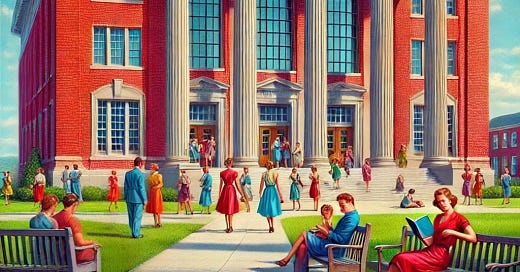There is a subtle method by which a civilization stores its wisdom so that each new generation of its leaders may discover it. This method is the library. Libraries accomplish this mission by providing the brightest of its citizens with learning far beyond what they might find in the schoolroom. American society owes its greatness to a public library system, extending to the furthest reaches of the nation, far exceeding in quality any such system occurring prior to it in history. Unfortunately, our public libraries are afflicted with a creeping malaise that is increasingly hard to ignore.
They are often stocked only with a small subset of bestsellers, and in many places function mainly as places where vagrants can receive freely the digital narcotic of the Internet Age. This provision of free computers poisons the very minds it was supposed to uplift. The stock of books has also been slowly reduced to the point that in many libraries none of the classics are available. Whole academic disciplines are sometimes entirely absent. The buildings are frequently grossly overpriced, and at the same time are often inferior specimens of the minimalist architecture that unfortunately characterizes our time. Certain pernicious ideologies are also leading certain works of literature and history to be removed altogether. It is therefore clear that most public libraries are no longer serving their purpose of rendering the accumulated wisdom of our civilization available to the public.
The only possible solution to this problem is a new form of library, independent of the public system. We will call it the Great American Library. It shall differ from the current public library in several significant ways. A Great American Library will contain a fixed set of classics drawn from our literary tradition. To keep costs low, only volumes in the public domain would be selected. In addition to classics, textbooks in most subjects in the public domain would be available. Such ventures as the Openstax project show what could be possible. In order to discourage the temptations of graft, and the corruption of the present system, each Great American Library would have to be administered as a private entity separate from any form of government. Perhaps the most important difference between a Great American Library and a public library would be the complete absence of the Internet. This would be one of their most valuable features, as it is fairly obvious that the public has become increasingly ignorant since the advent of portable internet access.
The Great American Libraries would be used by different readers for different reasons. They would be an ideal choice for homeschoolers looking for a learning center. It would be easy to place them even in unsafe areas, since they would contain nothing of value to the criminal element. Remote rural areas could install them in spare buildings, without great expense. Indeed, the construction of Great American Libraries would be in reach of anyone dissatisfied with the public variety. Given that many public libraries seem to be expurgating certain ideas and writers, a Great American Library might be the only place where one can find them.
Each Great American Library would be built from a common plan, in a simple yet elegant building constructed in the American Federal style. Modularity would be a key feature, as the local sponsoring organization could expand based on available funds and demand. They also need not be identical, as different churches, towns and other societies will have additional classics of unique value to themselves. Information regarding this sort of material will be available in a central database to all who request it. Thus, this system will aid in the general diffusion of common knowledge, as well as the preservation of regional culture.
Libraries are also a critical, if largely unseen driver of technological innovation. In the hands of the right reader, one biography of Tesla may hold more value than one hundred Chromebooks. Offline computerized stations for the focused learning of logic, physics and mathematics could also be built, as they would allow the power of computers to be harnessed for the benefit of students instead of the avarice of magnates. Indeed, providing knowledge of great inventors and far places to the right readers might be necessary to produce the scientists of the future. At this moment I am compiling a fundamental list of classics for the first Great American Library, available to Tom Swift subscribers. Subscribe if you would like to know more.





We are already doing this. Check out our list of private lending libraries at https://www.biblioguides.com/libraries/
And our support website for private lending librarians at https://thecardcatalog.notion.site/
If you have questions, email us at thecardcataloglibrarians@gmail.com
This is a great idea. I will definitely consider this for my own church. In the coming months, a Tom Swift membership will provide ways to make this easier.